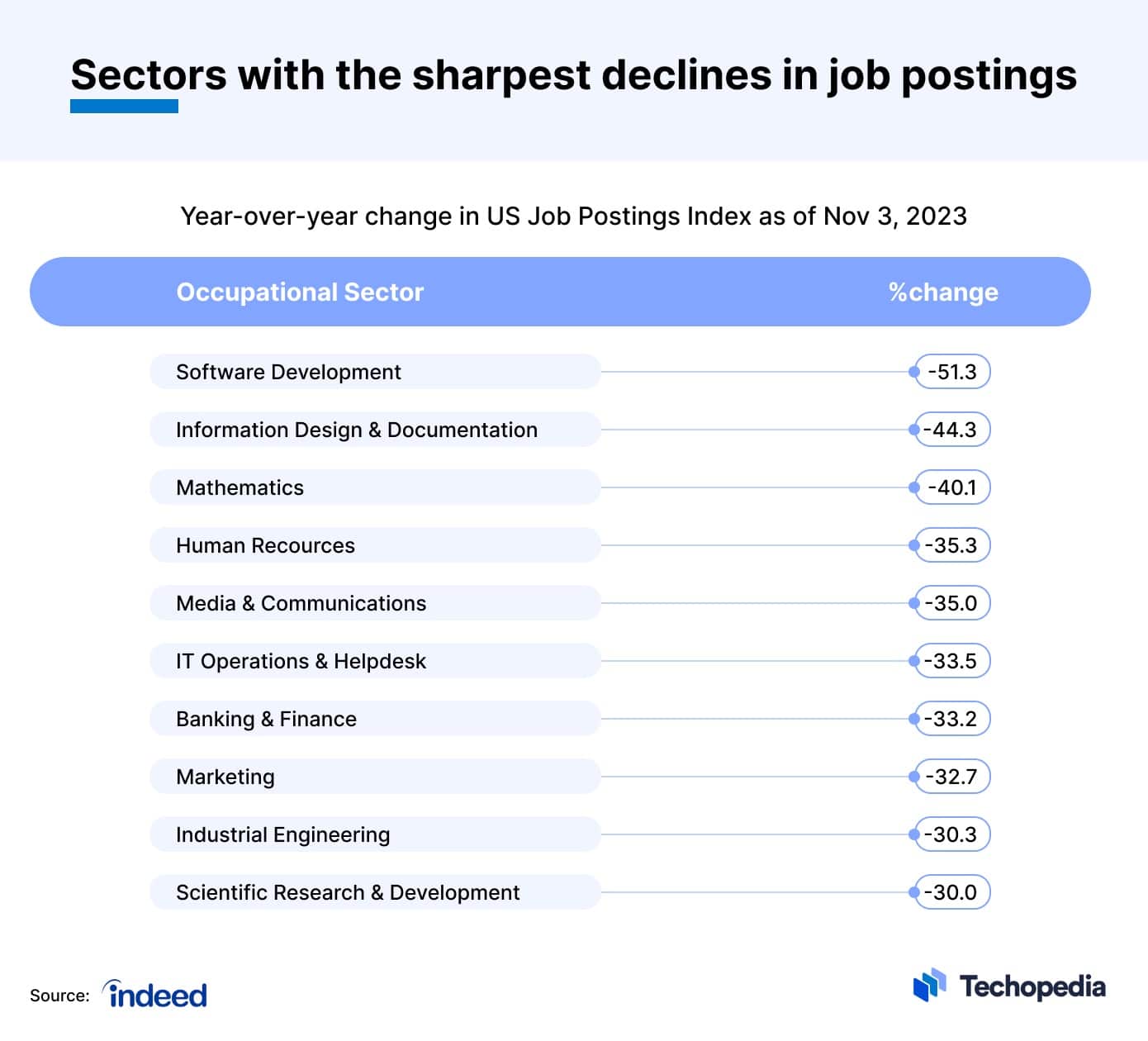By Neil C. Hughes

In 2023, the global tech sector confronted a significant paradox. On the one hand, tech layoffs increased by 50%, with over 240,000 jobs and counting lost worldwide.
Ironically, this occurred even as major companies heavily invested in artificial intelligence (AI), leading to a complex scenario of technological advancement and job insecurity. This situation has cast a long shadow over the tech landscape, raising questions about the future of employment and rising fears of unemployment.
However, there is hope on the horizon. Contrary to the bleak global outlook, there’s a window towards a more optimistic scenario for the US labor market. Despite economic challenges and the disruptive potential of AI, the labor market in 2023 demonstrated remarkable resilience and adaptability.
AI’s Role in Shaping Future CareersThe advancement of artificial intelligence, particularly generative AI, is reshaping the labor market, offering both challenges and opportunities for job seekers.
According to Indeed, the number of job postings containing the words “GenAI” or “Generative AI” was at <0.1% from 2020 to 2023.
And then, from the early months of 2023 to October 2023, it has lifted to 0.6% across all job adverts — if those numbers sound small, they should still raise an eyebrow. The need for workers with GenAI skills is growing.
Advertisements
The significant increase signals a major shift in the employment landscape. For professionals, it’s crucial to understand that GenAI’s impact extends beyond creating AI tools to its application across various sectors. This trend indicates that adapting to and understanding GenAI is becoming increasingly important for career advancement across multiple job functions.
IBM agreed, with their Institute for Business Value (IBM IBV) survey revealing that four out of five executives believe that generative AI will change employee roles and skills.
Employers and Employees and the New Rules of a Dynamic MarketIn addition, the evolving job market with GenAI calls for a reassessment of the economic impact of these technologies.
If GenAI-related job growth is focused primarily on tool creation, its broader economic benefits may be limited.
Conversely, widespread adoption of GenAI across various occupational sectors could lead to significant economic shifts akin to the mass adoption of personal computing.
For job seekers, this emphasizes the importance of keeping pace with GenAI job growth and understanding which sectors are at the forefront.
Especially if you consider the World Economic Forum’s Future of Jobs Report, which estimates that 44% of workers’ skill sets will become obsolete in the next five years.
The report also emphasizes cognitive skills like creative thinking, analytical thinking, technology literacy, and socio-emotional attributes such as curiosity, resilience, and lifelong learning.
While workers at all levels will feel the effects of generative AI, lower-level employees are expected to see the most significant shift. Staying informed about how GenAI is transforming industries is vital for making informed career decisions in an AI-influenced job market.
However, those who dare to explore beyond the scary headlines quickly learn that AI should be seen as a collaborator rather than a threat. For these reasons alone, it’s time to consider how AI-related roles align with your career goals and the overall economic landscape.
Evolving Job Market Dynamics: Insights for Job SeekersIndeed’s 2024 US Jobs & Hiring Trends Report provides an interesting insight into the current job market.
As of early November, the Indeed Job Postings Index was 22.5% lower than its peak on December 31, 2021.
Notably, the software development sector has witnessed the most pronounced decrease in job advertisements, registering a 51% reduction in one year alone.

Meanwhile, job seekers today also face a new reality after the “Great Resignation” spurred on by the COVID-19 pandemic.
This period, characterized by a significant rise in voluntary job departures, has changed the rules in job-seeking behavior, with professionals increasingly exploring opportunities outside their current fields.
This trend, coupled with employers implementing strategies like salary increments and enhanced benefits, underscores the need for job seekers to remain adaptable and align their career choices with evolving market trends, particularly in sectors like AI.
Meanwhile, employers are increasingly adopting salary transparency to attract job seekers. This shift and the need for job seekers to be proactive, informed, and flexible in their career planning highlight the importance of strategic adaptation in a competitive job market.
The increasing emphasis on work-life balance is highlighted by the fact that, per the National Bureau of Economic Research, 37% of UK jobs can be performed remotely.
Notably, 45% of professionals have reported changing their jobs when remote work options were unavailable, underscoring the growing importance of flexibility in the modern workplace.
Employment Trends in 2024As we look towards 2024, the job market landscape is set to undergo transformative changes. The paradox witnessed in the tech sector in 2023, where significant layoffs coincided with extensive investments in AI, is a precursor to a broader shift in employment dynamics. Employers and job seekers must navigate this new terrain with strategic foresight and adaptability.
For employers, the focus should be on sustaining workforce demand amidst changing economic conditions. This involves consistent job postings and innovatively attracting and retaining talent, particularly in fluctuating sectors like technology.
Integrating AI, especially GenAI, into business strategies is no longer an option but a necessity. Embracing this change means preparing for a workforce increasingly skilled in AI applications, a trend that marks a significant shift in required competencies and job roles.
On the other hand, job seekers face a reality reshaped by the aftermath of the “Great Resignation” and evolving job market dynamics. The key to staying ahead lies in adaptability and strategic career planning.
Aligning career goals with emerging market trends, especially in AI and technology-driven sectors, becomes crucial. Wage growth trends also indicate the need for job seekers to understand their market value and negotiate proactively.
The Bottom LineThe advancement of GenAI brings with it a reassessment of career paths and skills. As AI reshapes various sectors, professionals must consider how AI-related roles align with their career aspirations.
Embracing reskilling and upskilling, coupled with leveraging AI tools, is essential to enhance your capabilities and ensure collaboration with technology rather than being replaced by it.
Executives emphasize that this evolution is not just about learning to code; it’s about refining skills like time management and collaboration, underscoring that the path to thriving in today’s workforce invariably involves continual up-skilling.
Source: techopedia.com
Original Content:
https://www.techopedia.com/employment-trends-2024-embracing-upskilling-in-an-ai-driven-world